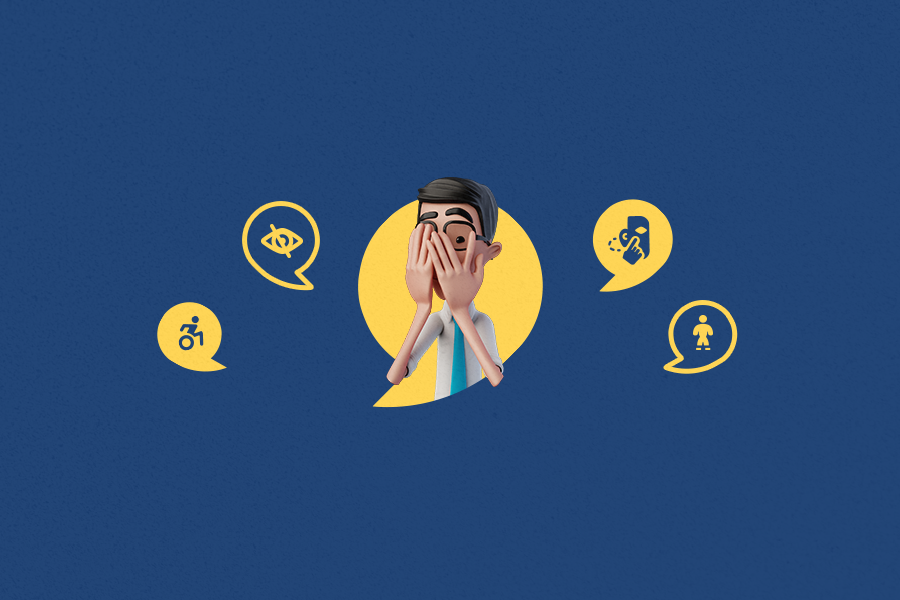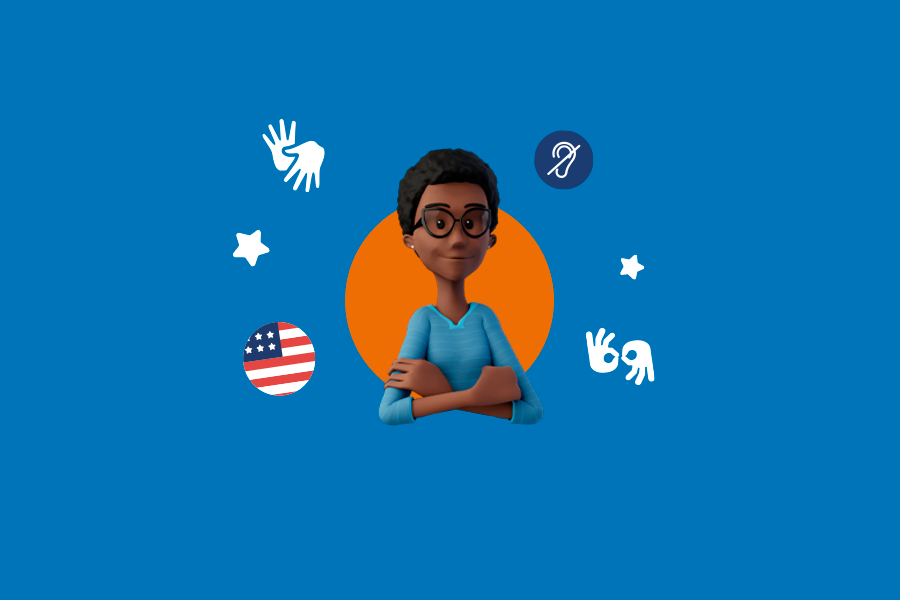
15 ableist expressions you should stop using right now

Every third Thursday of May, we celebrate the Global Accessibility Awareness Day (GAAD), where we dedicate ourselves to raising awareness about the importance of including people with disabilities in society.
In this scenario, it is super important for us to reflect on our attitudes and language, isn’t it? With that in mind, we have compiled 15 ableist expressions for you to completely delete from your vocabulary.
GAAD is an opportunity to learn, unlearn, and promote changes that make the world more inclusive and respectful. Come learn more about it!
What is GAAD and why is it important?
The idea for creating the Global Accessibility Awareness Day came from a text written by a web developer, Joe Devon, on his blog. The article ended up taking bigger proportions, and Joe joined forces with Jennison Asuncion, an accessibility professional, to make the date official.
GAAD’s goal is to get everyone talking, thinking and learning about digital access and inclusion, and about the enormous population of people with disabilities around the world today, which adds up to more than 1 billion individuals. In 2024, the date celebrates its 13th birthday, and the third year since the inauguration of the GAAD Foundation.
The Foundation aims to disrupt the culture of technology and digital product development to include accessibility as a core requirement. It has some big names as founding sponsors, such as Meta, Google, Twitter, among others.
What is ableism?
Ableism is the discrimination or prejudice against people with disabilities. It is based on the idea that physical or mental ability is an indicator of superiority, with a non-disabled body considered “normal” as the standard. In summary, ableism underestimates people’s capacity and aptitude because of their disability.
This is manifested in various forms, from condescending attitudes and prejudiced expressions to the systematic exclusion of people with disabilities from educational, employment, and social opportunities.
Ableism, like any other form of prejudice, can also happen in a veiled manner or as microaggressions, when someone refers to a person with a disability with a certain “heroism”, overvaluing their accomplishment of their basic tasks.
15 ableist expressions you should stop using right now
Now that you understand a little more about what ableism is and some ways in which it can manifest, it is time to check out some ableist expressions to never use again!
1. “Crazy” or “Insane”
Instead of using these terms, try saying something like “wild” or “unbelievable” to avoid associating mental illness with negativity.
2. “Lame”
Swap it out with “uncool” or “boring” to steer clear of unintentionally offending someone with mobility challenges.
3. “Blind to” or “Turn a blind eye”
Opt for “unaware” or “ignore” to convey the same idea without using blindness in a negative context.
4. “Wheelchair-bound” or “Confined to a wheelchair”
Use “wheelchair user” or “person who uses a wheelchair” to emphasize the person first, not their mobility aid.
5. “Retarded” or “Retard”
Instead, use terms like “slower” or “delayed” to avoid hurtful language towards individuals with intellectual disabilities.
6. “Pyscho” or “Psychopath”
Try “unpredictable” or “unsettling” to express similar sentiments without stigmatizing mental health conditions.
7. “Cripple” or “Crippled”
Choose phrases like “person with a disability” or “someone who experiences mobility challenges” to be more respectful and inclusive.
8. “Mute” or “Dumb”
Use “nonverbal” or “person with a speech disability” to describe individuals without resorting to offensive language.
9. “Hysterical”
Swap it for “overreacting” or “emotional” to avoid reinforcing outdated gender stereotypes and negative attitudes towards mental health.
10. “Invalid” or “Invalide”
Instead, use terms like “not valid” or “not acceptable” to express the same idea without implying worthlessness.
11. “Crazy as a loon”
Try “eccentric” or “quirky” to convey similar ideas without using ableist or speciesist language.
12. “Nuts” or “Nutjob”
Use “eccentric” or “unconventional” to describe someone without resorting to stigmatizing language about mental health.
13. “Spaz” or “Spastic”
Instead, say “clumsy” or “awkward” to avoid unintentionally offending someone with cerebral palsy or related conditions.
14. “Having a meltdown” or “Throwing a tantrum”
Try “struggling” or “having a tough time” to acknowledge difficulties without trivializing someone’s experience.
15. “Handicapable” or “Special needs”
Opt for “capable” or “unique needs” to emphasize inclusivity and respect without seeming patronizing.
What is the importance of using an inclusive language?
Using inclusive and accessible language is essential for respecting the dignity and identity of people with disabilities. Some ways of doing this include:
- The person comes first: we should put the person before the disability, such as “person with a disability” instead of “disabled”;
- Using appropriate terminology: educate yourself about the correct terms to refer to different disabilities and avoid pejorative terms, like the ableist expressions we just mentioned;
- Avoiding simplistic labels: refrain from categorizing people solely by their disabilities, recognizing the complexity of their identities;
- Respecting individual preferences: some people prefer specific terms to refer to their disabilities, respect those preferences. For example, among people with hearing impairments, some identify as deaf and others do not, mainly because of the cultural factor involved in this term.
Conclusion
In this Global Accessibility Awareness Day, this date that symbolizes a continuous struggle. We must commit to being anti-ableist, challenging entrenched prejudices, and adopting a more inclusive language.
Awareness of ableism is an essential step in creating a truly inclusive society. Remember that words have power, and using respectful and inclusive language is a great way to start promoting equality and understanding.
Do you want to continue exploring the universe of inclusion and diversity? Then visit the Hand Talk blog. Here you can access a lot of content with tips and practices for more inclusive actions, both for individuals and for large organizations!


